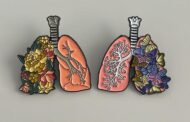In 2021, people living with lung cancer and their caregivers will likely be attending virtual oncology conferences such as the 2020 WCLC and making deep dives into research in record numbers. Due to improvements in lung cancer diagnosis and treatment, more patients with lung cancer are living longer and better, thus becoming increasingly involved in advocating for themselves and others. Additionally, the COVID-19 pandemic has removed many barriers to participation because conference attendance no longer requires expensive and time-consuming travel. A number of conferences—again, including the WCLC—even offer complimentary registration for those impacted directly by lung cancer.
With a greater number of empowered and involved patients, it is more necessary than ever for research to pay attention to the use of patient-sensitive language. Words used to write research publications and present at conferences should be inclusive of patients and represent the reality of the people who live daily with the disease and accompanying treatments.
Putting the Person in Personalized Medicine
Think about the construction of referring to a person living with lung cancer as a “lung cancer patient.” This phrase defines the person by their disease, which is lung cancer. Patients are much more than their disease and have individual goals and needs, which are critical to recognize. They are people first, and the language used to describe them needs to recognize this. A much more patient-centric phrase would be “people with lung cancer,” as is used in this article, or even “patients with lung cancer.”
The labels “smokers” and “nonsmokers” are similarly fraught for patients. Again, preference should be given to a construction that puts the patient first: namely, “people who smoke” and “people who don’t smoke.” However, when people with lung cancer are divided into two categories this way, an important segment of the population remains uncategorized—people who used to smoke, but no longer do. There does not appear to be a standard definition of a “former smoker” in research, and often it is unclear whether people who used to smoke are included in the “smokers” or “nonsmokers” category in studies and presentations. Research needs to recognize, define, and study this subpopulation in order to be truly inclusive and reduce stigma.
Language around smoking–cessation efforts also needs increased patient sensitivity. Many people started smoking in their youth when smoking was not only socially acceptable but was considered to be socially advantageous and sanctioned. All the “cool kids” smoked. Smoking-cessations programs often refer to “quitting” smoking, which has a negative connotation; typically when one “quits” something, they lose and surrender. Instead, discussions of smoking-cessation should focus on “stopping smoking,” which is a much more empowering phrase for patients because it invokes the ability to make a life choice. No person living with lung cancer should be made to feel that they are to blame for their disease or deserve to have lung cancer because of their smoking history.
When therapies stop working for a person living with lung cancer, it is not appropriate to say that a “patient failed treatment.” This makes it sound as if it is a patient’s fault if a treatment stops being effective. In actuality, treatments fail patients, as opposed to patients failing treatments. A good way to reference this fact in research is simply by saying “therapy was ineffective” or “therapy stopped working” for the patient in question. When this occurs, patients do not progress; their lung cancer progresses. Patients are not synonymous with the cancer that exists in their bodies.
When patients living with lung cancer volunteer for a clinical trial, it is also not sensitive to call them “subjects” or even “human subjects.” By saying this, there is an implication that patients do not have the ability to choose their treatments and instead are “subjected” to them. In addition to being disrespectful, this phrasing leads to increased fear and resistance to participation in clinical trials in some populations because of a mistaken belief that clinical trials are last resorts that are only appropriate for “guinea pigs.” Patients should be recognized as having a choice in selecting a trial as a possible treatment option and should be called “participants” or “volunteers” instead.
We are recommending that we all—clinicians, researchers, advocates, and other members of the lung cancer community—make an effort in this new year to choose patient-sensitive language, paying special attention to the examples listed within this article. Although people with lung cancer do not expect perfection, and we recognize the existence of shortened word limits for slides, abstracts, and other presentations, we hope that by working together, we can all make progress in this area in 2021. By increasing our attention to language, we believe that improvements in physician–patient–researcher relationships can be made, and stigma associated with lung cancer can be reduced.
NOTE: In addition to providing multiple opportunities to amplify the patient voice, the IASLC will be releasing a guide in the near future to appropriate language, created by patient advocates.






